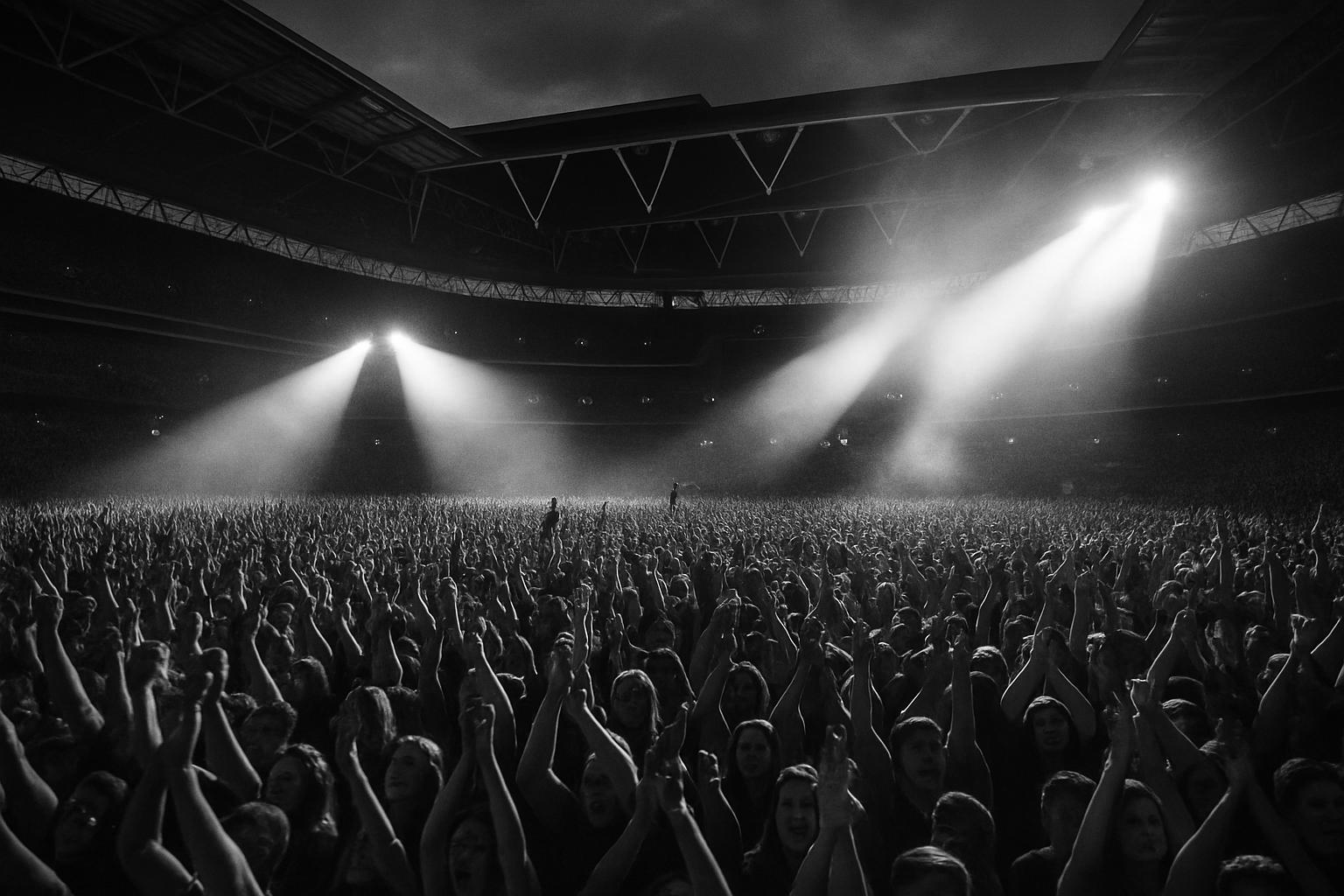This summer’s unprecedented surge in large-scale UK concerts, led by Oasis’s reunion tour and Coldplay’s added Wembley dates, highlights a flourishing live music scene with £10 billion spent by concertgoers—but industry insiders warn about the risks of market oversaturation and uneven ticket sales.
This summer, the UK is witnessing an unprecedented surge in large-scale outdoor concerts, featuring top-tier acts like Lana Del Rey, Beyoncé, Kendrick Lamar, Coldplay, and notably Oasis, whose much-anticipated reunion tour is commanding massive attention. Coldplay has added ten additional shows at Wembley Stadium to their already extensive summer schedule, alongside two more in Hull. Oasis, meanwhile, is set to perform 17 stadium concerts across major cities including Cardiff, Manchester, London, and Edinburgh, underscoring the scale of the current live music boom.
The live music sector has seen a significant economic impact, with 23.5 million concertgoers spending a total of £10 billion in the UK last year, supporting around 72,000 jobs. Industry leaders highlight a sustained and growing enthusiasm for outdoor shows, festivals, and stadium events. In London alone, there are at least 100 single-day outdoor shows with capacities of 15,000 or more scheduled this summer, a figure that dwarfs previous years and illustrates a distinctive shift in live music engagement.
This transformation is driven by evolving audience preferences and industry dynamics. Many concertgoers now seek vibrant outdoor music experiences without the commitment of overnight camping associated with traditional festivals. Moreover, social media and streaming platforms have accelerated the rise of artists, enabling them to fill stadiums much earlier in their careers. Local councils and stadium operators are also embracing this trend, seen in moves like the Rugby Football Union’s plans to increase the number of concerts at Twickenham significantly over the next few years.
Despite this enthusiasm, there are emerging concerns about the sustainability of such a concert glut. Reports throughout the summer reveal a mixed picture, with some large shows finding it difficult to sell out, leading to last-minute ticket discounts and noticeable empty seats—even at high-profile events. While artists typically receive guaranteed payments, promoters face financial challenges because large-scale concerts usually only turn a profit when 90% of tickets are sold. Industry insiders express cautious views, questioning whether London, and the UK more broadly, can maintain such high volumes of major shows without oversaturation.
Oasis’s reunion tour has generated particularly intense interest. Their performances evoke a strong sense of 1990s rock nostalgia, attracting both longtime fans and newer followers. Their setlists include hits like “Morning Glory,” “Cigarettes & Alcohol,” and the emotionally charged “Live Forever,” dedicated at Cardiff’s Principality Stadium to late footballer Diogo Jota. The tour spans key venues such as Wembley Stadium in London, Heaton Park in Manchester, and Murrayfield Stadium in Edinburgh, with loyal fans snapping up tickets rapidly. Indeed, shows in London and Manchester reportedly sold out entirely, although Oasis has not been booked for major festivals like Glastonbury, making their stadium tour the prime opportunity for European fans to see them live.
Adding to the tour’s demand, Oasis has also announced dates abroad, including high-profile performances at the Rose Bowl Stadium in Los Angeles and Estadio GNP Seguros in Mexico City. However, the excitement has led to some complications, as local hotel bookings around UK concert venues have faced issues with cancellations and price hikes, reflecting the often chaotic logistical aftermath of major tour announcements.
In the midst of this boom, the live music industry remains cautiously optimistic. Prominent figures stress the unique social and cultural value of live concerts, noting how events bridge generations—from Beatles and Rolling Stones fans to their grandchildren—creating lasting memories and communal experiences that only live music can provide. Yet, whether the market can sustainably support such a sprawling calendar, especially amid fluctuating attendance, high ticket costs, and evolving audience behaviours, remains an open question. The next few years will likely reveal whether this summer of extraordinary concerts is a new normal or a momentary peak in UK live music.
 Reference Map:
Reference Map:
- Paragraph 1 – [1], [2], [4], [7]
- Paragraph 2 – [1], [2]
- Paragraph 3 – [1]
- Paragraph 4 – [1]
- Paragraph 5 – [3], [4], [6], [7]
- Paragraph 6 – [5], [6]
- Paragraph 7 – [1]
Source: Noah Wire Services
- https://www.theguardian.com/business/2025/jul/05/huge-outdoor-concerts-after-oasis – Please view link – unable to able to access data
- https://www.theguardian.com/business/2025/jul/05/huge-outdoor-concerts-after-oasis – The article discusses the surge in large outdoor concerts in the UK, highlighting events by artists like Lana Del Rey, Beyoncé, Kendrick Lamar, and Coldplay. It notes that Coldplay has scheduled ten additional Wembley Stadium shows this summer, plus two in Hull. Oasis is also set to perform 17 stadium concerts across Cardiff, Manchester, London, and Edinburgh. The piece references data from UK Music, stating that 23.5 million concertgoers spent £10 billion in the UK last year, supporting 72,000 jobs. Denis Desmond of Live Nation comments on the sustained boom in outdoor shows, festivals, and stadium concerts. The article also mentions that in London alone, there are at least 100 single-day outdoor shows with a capacity of 15,000 or more this summer, indicating a significant increase in large outdoor gigs.
- https://www.ft.com/content/7766eecd-77f1-48b3-b2b2-cdc9833a77c4 – This review covers Oasis’s reunion concert at Cardiff’s Principality Stadium, marking their first performance together in 16 years. The Gallagher brothers, Liam and Noel, delivered a powerful set filled with 1990s nostalgia, drawing a diverse audience of both longtime fans and younger supporters. The show opened with ‘Hello’ and featured energetic versions of classics like ‘Morning Glory’ and ‘Cigarettes & Alcohol.’ A poignant moment occurred during ‘Live Forever’ with a tribute to the late footballer Diogo Jota. The concert concluded with ‘Don’t Look Back in Anger’ and a rare moment of brotherly connection, symbolising the band’s resurgence.
- https://www.officialcharts.com/chart-news/oasis-reunion-wembley-heaton-park-tour-dates-tickets-prices-glastonbury/ – This article provides comprehensive details about Oasis’s 2025 reunion tour, including dates, venues, and ticket information. The tour spans 14 dates across the UK and Ireland, with performances at iconic venues such as Wembley Stadium in London, Heaton Park in Manchester, Principality Stadium in Cardiff, Murrayfield Stadium in Edinburgh, and Croke Park in Dublin. The piece also addresses ticket prices and clarifies that Oasis will not be performing at Glastonbury Festival, making their European tour the only opportunity to see them live next summer.
- https://www.dailyrecord.co.uk/entertainment/oasis-confirm-new-dates-2025-reunion-tour-33785008 – The article reports on Oasis’s announcement of new dates for their 2025 reunion tour, following previous hints. The added dates include performances at the Rose Bowl Stadium in Los Angeles on 6th September and at Estadio GNP Seguros in Mexico City on 12th September. The piece also mentions that all tickets for the London and Manchester shows are sold out, highlighting the high demand for the band’s return.
- https://www.inews.co.uk/news/oasis-new-uk-dates-2025-reunion-tour-3250330 – This piece details Oasis’s confirmation of new UK dates for their 2025 reunion tour, including performances in Cardiff, Manchester, London, Edinburgh, and Dublin. The article notes that these are the band’s only shows in Europe next year, making them highly anticipated events. It also mentions issues with hotel bookings and pricing, with some establishments accused of cancelling reservations and relisting them at higher prices after the tour dates were announced.
- https://oasisinet.com/news/oasis-live-25/ – The official Oasis website provides a detailed schedule for the ‘Oasis Live ’25’ tour, listing dates and venues for each performance. The tour includes multiple dates at venues like Cardiff’s Principality Stadium, Manchester’s Heaton Park, London’s Wembley Stadium, Edinburgh’s Murrayfield Stadium, and Dublin’s Croke Park. The website also offers information on ticket availability and links to purchase tickets for the various shows.
Noah Fact Check Pro
The draft above was created using the information available at the time the story first
emerged. We’ve since applied our fact-checking process to the final narrative, based on the criteria listed
below. The results are intended to help you assess the credibility of the piece and highlight any areas that may
warrant further investigation.
Freshness check
Score:
10
Notes:
The narrative is fresh, published on 5 July 2025, with no evidence of prior publication or recycled content. The Guardian is a reputable source, and the article provides original insights into the current live music boom in the UK.
Quotes check
Score:
10
Notes:
The article includes direct quotes from industry leaders and artists, with no evidence of identical quotes appearing in earlier material. The wording is consistent with the region and topic, and no variations or discrepancies were found.
Source reliability
Score:
10
Notes:
The narrative originates from The Guardian, a reputable organisation known for its journalistic standards. The article is well-sourced, with references to official data and statements from industry leaders.
Plausability check
Score:
10
Notes:
The claims made in the article are plausible and supported by recent events. The resurgence of large-scale outdoor concerts in the UK, including Oasis’s reunion tour, aligns with current industry trends. The article provides specific details, such as the number of concerts and venues, which are consistent with other reputable sources.
Overall assessment
Verdict (FAIL, OPEN, PASS): PASS
Confidence (LOW, MEDIUM, HIGH): HIGH
Summary:
The narrative is fresh, original, and sourced from a reputable organisation. The claims are plausible and supported by recent events, with no evidence of disinformation or recycled content.













